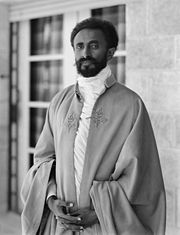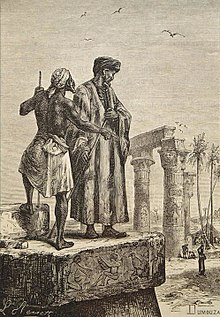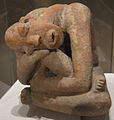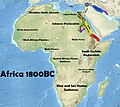Portal:Africa



Africa is the world's second largest and second-most populous continent after Asia. At about 30.3 million km2 (11.7 million square miles) including adjacent islands, it covers 20% of Earth's land area and 6% of its total surface area. With 1.4 billion people0 as of 2021, it accounts for about 18% of the world's human population. Africa's population is the youngest amongst all the continents; the median age in 2012 was 19.7, when the worldwide median age was 30.4. Despite a wide range of natural resources, Africa is the least wealthy continent per capita and second-least wealthy by total wealth, ahead of Oceania. Scholars have attributed this to different factors including geography, climate, tribalism, colonialism, the Cold War, neocolonialism, lack of democracy, and corruption. Despite this low concentration of wealth, recent economic expansion and the large and young population make Africa an important economic market in the broader global context.
Africa straddles the equator and the prime meridian. It is the only continent to stretch from the northern temperate to the southern temperate zones. The majority of the continent and its countries are in the Northern Hemisphere, with a substantial portion and a number of countries in the Southern Hemisphere. Most of the continent lies in the tropics, except for a large part of Western Sahara, Algeria, Libya and Egypt, the northern tip of Mauritania, and the entire territories of Morocco, Ceuta, Melilla, and Tunisia which in turn are located above the tropic of Cancer, in the northern temperate zone. In the other extreme of the continent, southern Namibia, southern Botswana, great parts of South Africa, the entire territories of Lesotho and Eswatini and the southern tips of Mozambique and Madagascar are located below the tropic of Capricorn, in the southern temperate zone.
Africa is highly biodiverse; it is the continent with the largest number of megafauna species, as it was least affected by the extinction of the Pleistocene megafauna. However, Africa also is heavily affected by a wide range of environmental issues, including desertification, deforestation, water scarcity and pollution. These entrenched environmental concerns are expected to worsen as climate change impacts Africa. The UN Intergovernmental Panel on Climate Change has identified Africa as the continent most vulnerable to climate change.
The history of Africa is long, complex, and has often been under-appreciated by the global historical community. Africa, particularly Eastern Africa, is widely accepted as the place of origin of humans and the Hominidae clade (great apes). The earliest hominids and their ancestors have been dated to around 7 million years ago, including Sahelanthropus tchadensis, Australopithecus africanus, A. afarensis, Homo erectus, H. habilis and H. ergaster—the earliest Homo sapiens (modern human) remains, found in Ethiopia, South Africa, and Morocco, date to circa 233,000, 259,000, and 300,000 years ago, respectively, and Homo sapiens is believed to have originated in Africa around 350,000–260,000 years ago. Africa is also considered by anthropologists to be the most genetically diverse continent as a result of being the longest inhabited. (Full article...)
Selected article –
The Algerian Civil War (Arabic: الحرب الأهلية الجزائرية), known in Algeria as the Black Decade (Arabic: العشرية السوداء, French: La décennie noire), was a civil war fought between the Algerian government and various Islamist rebel groups from 11 January 1992 (following a coup negating an Islamist electoral victory) to 8 February 2002. The war began slowly, as it initially appeared the government had successfully crushed the Islamist movement, but armed groups emerged to declare jihad and by 1994, violence had reached such a level that it appeared the government might not be able to withstand it. By 1996–97, it had become clear that the Islamist resistance had lost its popular support, although fighting continued for several years after.
The war has been referred to as 'the dirty war' (la sale guerre), and saw extreme violence and brutality used against civilians. Islamists targeted journalists, over 70 of whom were killed, and foreigners, over 100 of whom were killed, although it is thought by many that security forces as well as Islamists were involved, as the government had infiltrated the insurgents. Children were widely used, particularly by the rebel groups. Total fatalities have been estimated at 44,000 to between 100,000 and 200,000. (Full article...)Featured pictures –
Did you know (auto-generated) -

- ... that African-American journalist Erna P. Harris was called a "fearless critic" of the internment of Japanese Americans by the US government during World War II?
- ... that Roland Jefferson, the first African-American botanist to work at the U.S. National Arboretum, helped preserve the famous flowering cherry trees in Washington, D.C.?
- ... that opera singer Charles Holland spent much of his career in Europe as opportunities in classical music for African Americans were limited?
- ... that in South Africa's genocide case against Israel, the International Court of Justice ordered Israel to "punish the direct and public incitement to commit genocide" against Palestinians in Gaza?
- ... that the son of an engine fitter from England became Director of Education in part of modern-day South Africa for almost twenty years?
- ... that African porters in Salvador, Bahia, went on strike after the provincial government passed a law requiring them to wear metal identification tags?
Categories
Selected biography –
Abū Abd Allāh Muḥammad ibn Abd Allāh Al-Lawātī (/ˌɪbən bætˈtuːtɑː/; 24 February 1304 – 1368/1369), commonly known as Ibn Battuta, was a Maghrebi traveller, explorer and scholar. Over a period of thirty years from 1325 to 1354, Ibn Battuta visited most of North Africa, the Middle East, East Africa, Central Asia, South Asia, Southeast Asia, China, the Iberian Peninsula, and West Africa. Near the end of his life, he dictated an account of his journeys, titled A Gift to Those Who Contemplate the Wonders of Cities and the Marvels of Travelling, but commonly known as The Rihla.
Ibn Battuta travelled more than any other explorer in pre-modern history, totalling around 117,000 km (73,000 mi), surpassing Zheng He with about 50,000 km (31,000 mi) and Marco Polo with 24,000 km (15,000 mi). There have been doubts over the historicity of some of Ibn Battuta's travels, particularly as they reach farther East. (Full article...)Selected country –
 |
 |
||

| |||
Eritrea (Ge'ez: ኤርትራ ʾĒrtrā) is a country situated in northern East Africa. It is a multilingual and multicultural country with two dominant religions (Sunni Islam and Oriental Orthodox Christianity) and nine ethnic groups. It is bordered by Sudan in the west, Ethiopia in the south, and Djibouti in the southeast. The east and northeast of the country have an extensive coastline on the Red Sea, directly across from Saudi Arabia and Yemen. The Dahlak Archipelago and several of the Hanish Islands are part of Eritrea.
Eritrea was consolidated into a colony by the Italian government on January 1, 1890. Upon Italy's losses in World War II, Eritrea was ruled as a British protectorate between 1941 and 1952. Following a UN plebiscite in 1950, a resolution 390 (V) was adopted to have Eritrea enter into a federation with Ethiopia in 1952. Emperor Haile Selassie I nevertheless annexed Eritrea as Ethiopia's 14th province in 1961 sparking the 30-year Eritrean War of Independence. Following a UN-supervised referendum, Eritrea declared and gained international recognition for its independence in 1993. (Read more...)
Selected city –
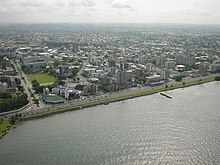
Libreville is the capital and largest city of Gabon. Occupying 65 square kilometres (25 sq mi) in the northwestern province of Estuaire, Libreville is a port on the Komo River, near the Gulf of Guinea. As of the 2013 census, its population was 703,904.
The area has been inhabited by the Mpongwe people since before the French acquired the land in 1839. It was later an American Christian mission, and a slave resettlement site, before becoming the chief port of the colony of French Equatorial Africa. By the time of Gabonese independence in 1960, the city was a trading post and minor administrative centre with a population of 32,000. Since 1960, Libreville has grown rapidly and now is home to one-third of the national population. (Full article...)In the news
- 12 February 2024 –
- Two boats collide on the Congo River near Kinshasa, Democratic Republic of the Congo; with the death toll remains unclear. (AP)
- 11 February 2024 – 2023 Africa Cup of Nations
- In association football, hosts Ivory Coast win their third Africa Cup of Nations by defeating Nigeria 2–1 in the final. Sébastien Haller scores the winning goal in the 81st minute. (The Guardian)
- 10 February 2024 – Somali civil war
- Four Emirati soldiers and a Bahraini military officer are killed, while ten other people are injured, when a soldier opens fire at a military base in Mogadishu, Somalia, before being killed in the ensuing shootout. Al-Shabaab claims responsibility. (AP)
- 10 February 2024 –
- A Eurocopter EC130 helicopter crashes near Nipton, California, United States, killing all the six people on board, including Nigerian banker Herbert Wigwe. (CBS News)
- 10 February 2024 – 2023–2024 Senegalese protests
- Violent protests occur in Senegal following an announcement by President Macky Sall that presidential elections have been delayed from February 25 to December 15. (Sky News)
- 9 February 2024 –
- At least 18 people are killed during a collision between a bus and a truck on a road in Kinshasa, Democratic Republic of the Congo. (AP)
Updated: 16:33, 14 February 2024
General images -
Africa topics
More did you know –

- ...that the 1459 Fra Mauro map (pictured) reports that "a junk from India" rounded the Cape of Good Hope in 1420, around 70 years before the navigations of Vasco da Gama?
- ...that the 1998 Sudan famine was caused by human rights abuses in the midst of the Second Sudanese Civil War?
- ...that a smokie is a West African delicacy made by blowtorching the carcass of a sheep or goat without removing its fleece?
- ...that Anne-Marie Nzié, a Cameroonian bikutsi singer, dedicated the song Liberté to President Paul Biya and his party, the Cameroon People's Democratic Movement?
Related portals
Major Religions in Africa
North Africa
West Africa
Central Africa
East Africa
Southern Africa
Associated Wikimedia
The following Wikimedia Foundation sister projects provide more on this subject:
-
Commons
Free media repository -
Wikibooks
Free textbooks and manuals -
Wikidata
Free knowledge base -
Wikinews
Free-content news -
Wikiquote
Collection of quotations -
Wikisource
Free-content library -
Wikispecies
Directory of species -
Wikiversity
Free learning tools -
Wikivoyage
Free travel guide -
Wiktionary
Dictionary and thesaurus



















